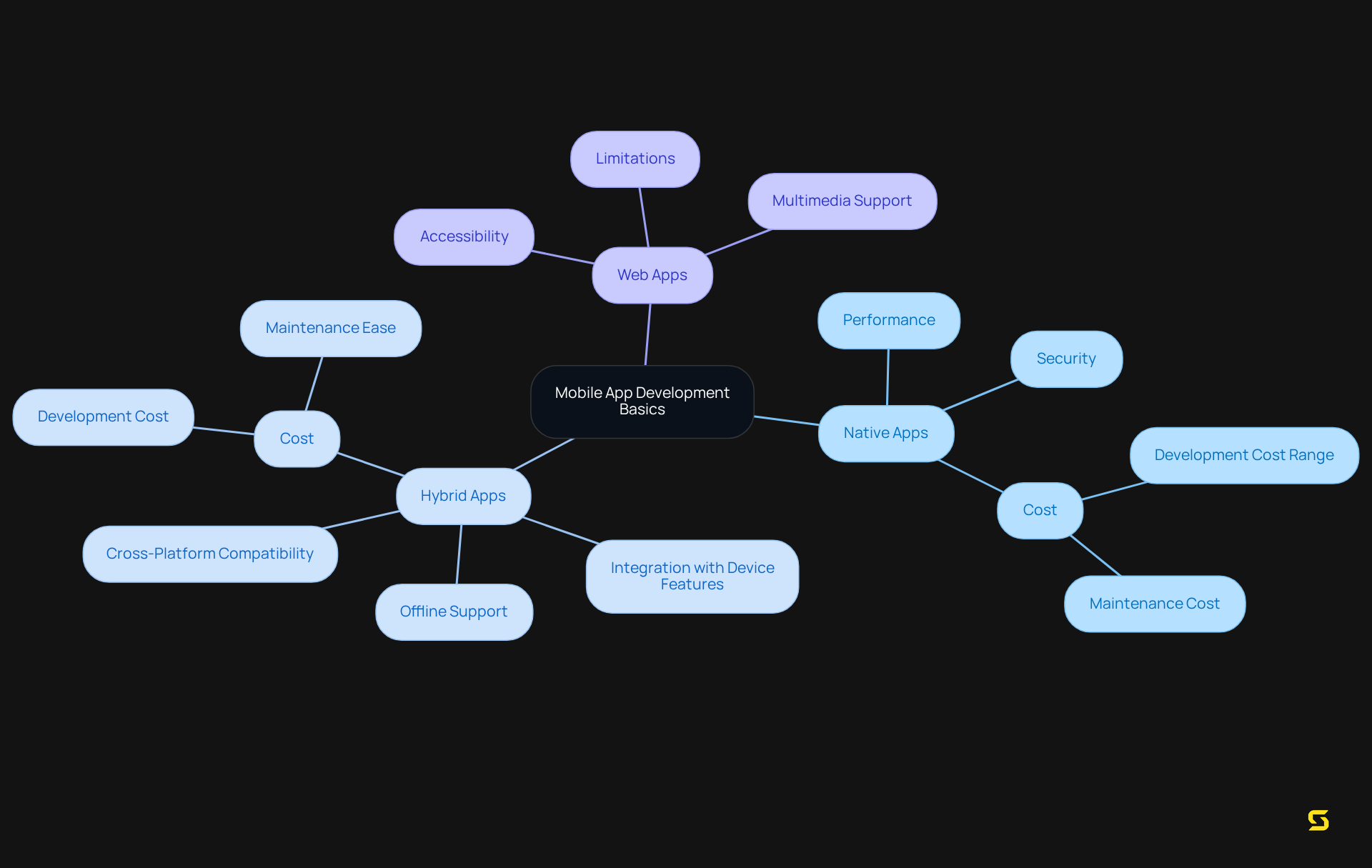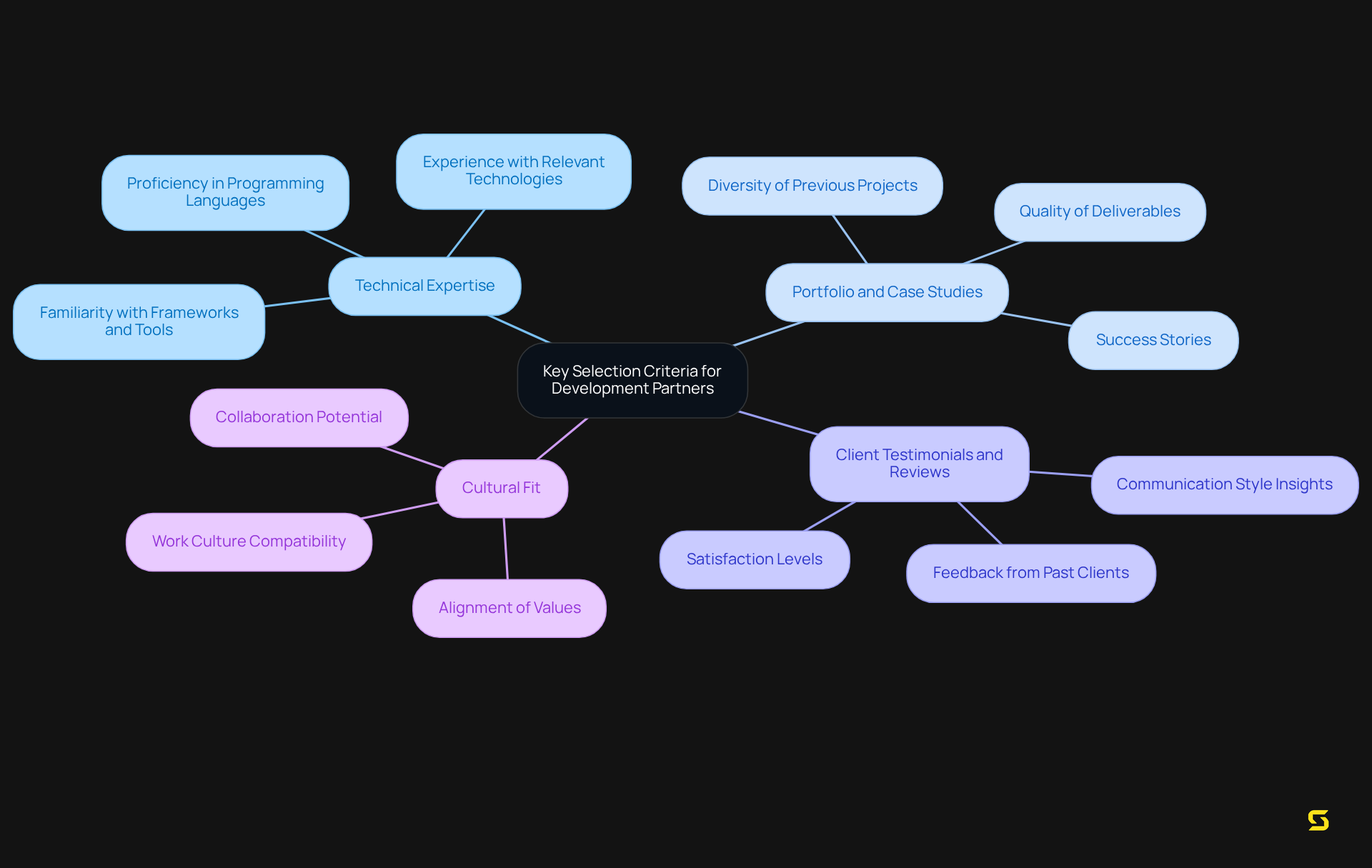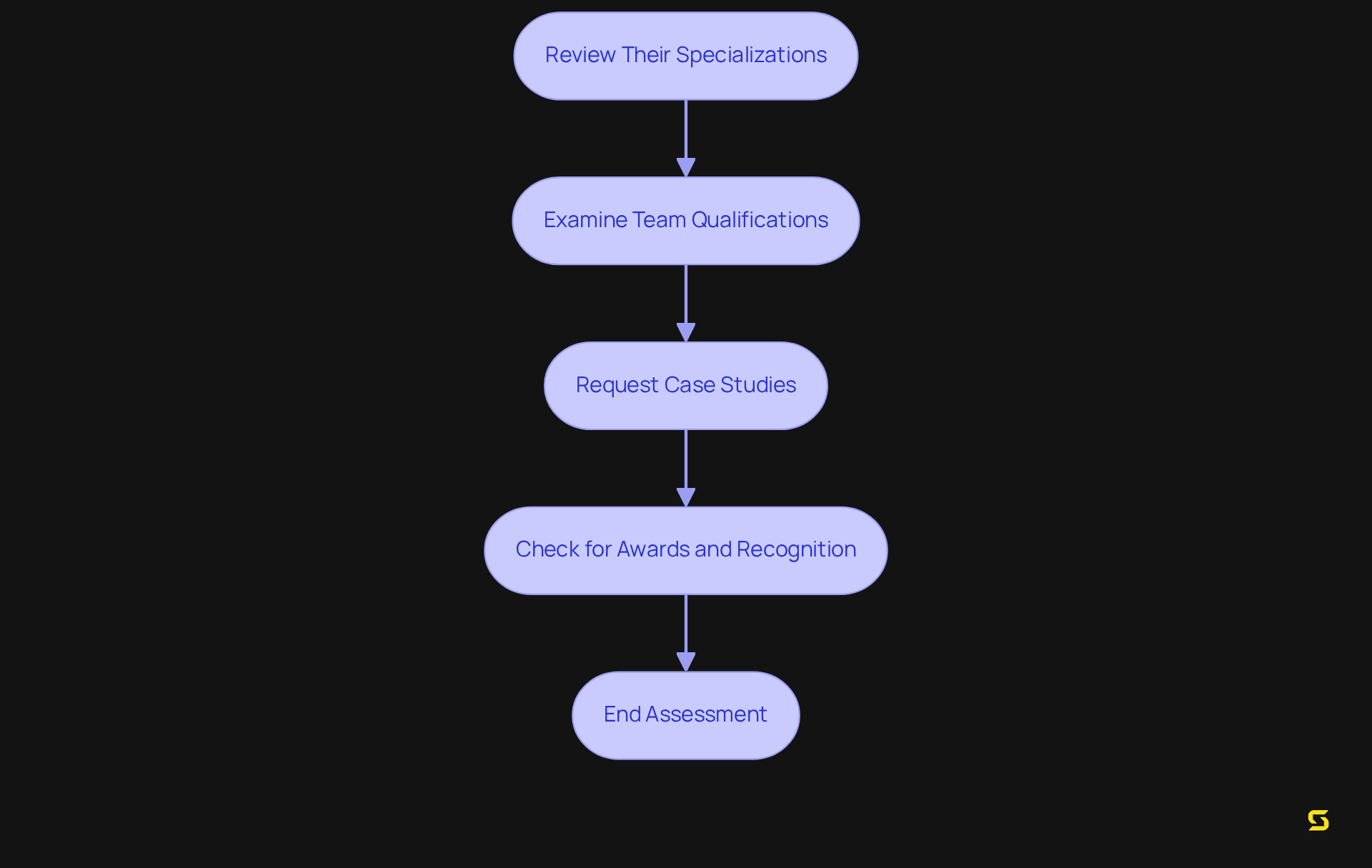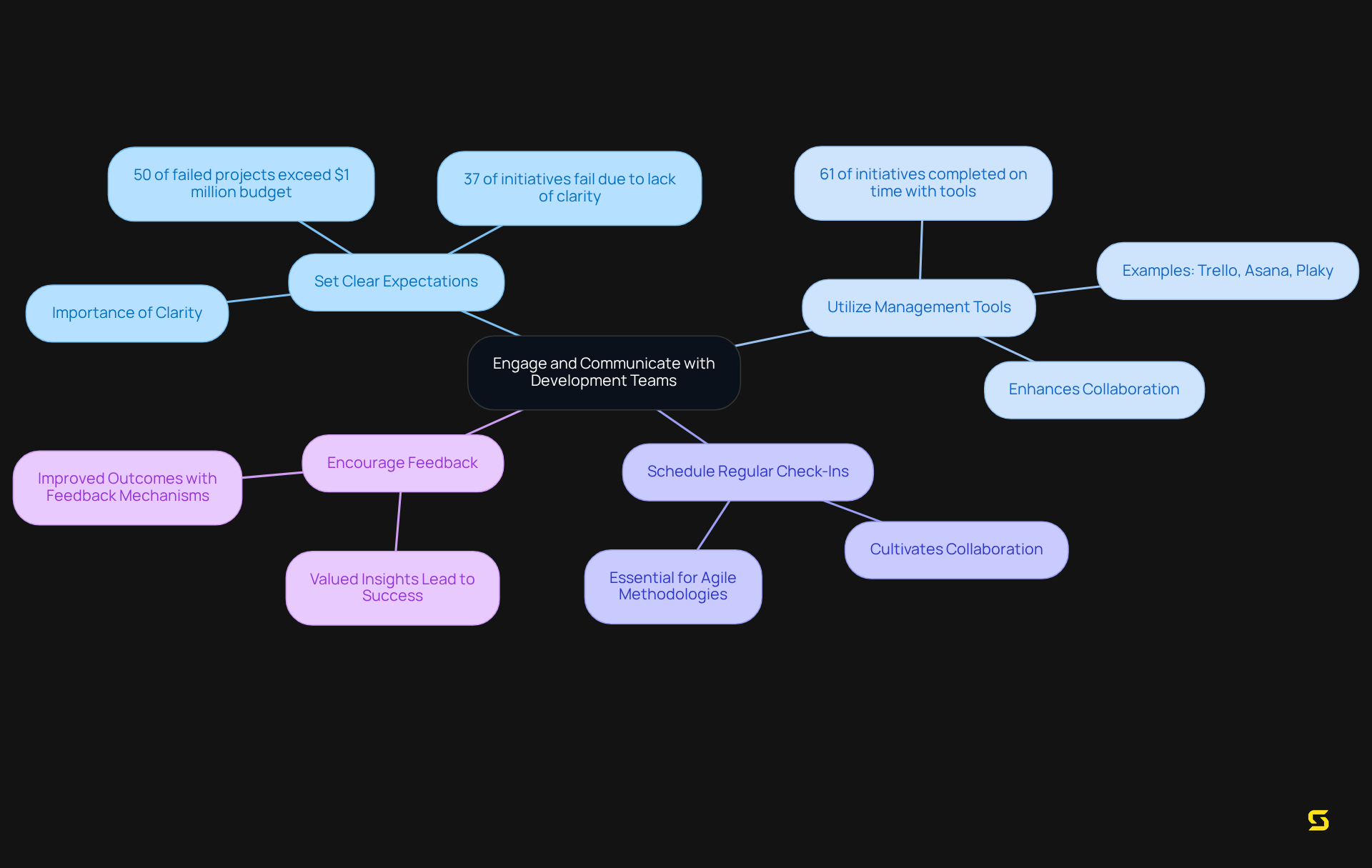Overview
Choosing the right mobile app development company is a critical decision that demands a thorough understanding of mobile app development fundamentals. To make an informed choice, it is vital to:
- Evaluate key selection criteria
- Assess the expertise of potential companies
- Engage effectively with development teams
Understanding the various types of apps is essential; this knowledge sets the foundation for a successful partnership. Furthermore, reviewing technical expertise and portfolios provides insight into the capabilities of potential partners. Clear communication throughout the process ensures that expectations align, ultimately leading to a successful project outcome.
Introduction
Selecting the right mobile app development company is a pivotal decision that can significantly influence the success of your project. In a landscape brimming with options, understanding the nuances of mobile app development—from native to hybrid and web applications—is essential. This guide presents a structured approach to identifying your ideal development partner, emphasizing key selection criteria and best practices for effective collaboration. As businesses increasingly rely on mobile solutions, the challenge remains: how can you ensure that you choose a company that not only meets your technical requirements but also aligns with your vision and goals?
Understand Mobile App Development Basics
Before selecting a mobile app development company, it is essential to grasp the fundamentals of mobile app development, particularly the distinctions among native, hybrid, and web applications.
- Native Apps: These applications are meticulously crafted for a single platform, either iOS or Android, utilizing platform-specific programming languages such as Swift for iOS and Kotlin for Android. They provide exceptional performance and user experience, yet require separate codebases for each platform, potentially increasing development time and costs. Additionally, native apps are highly secure due to integrated security features, making them the preferred choice for sensitive applications. The cost to develop a native application for both platforms individually can range from $30,000 to $32,000.
- Hybrid Apps: Hybrid applications merge characteristics of both native and web apps. They are built using web technologies like HTML, CSS, and JavaScript, encapsulated in a native container to enable cross-platform compatibility. This methodology facilitates faster development and easier maintenance, rendering hybrid apps an attractive option for businesses aiming for cost-effective solutions. Hybrid apps can seamlessly integrate with device features such as the camera, GPS, and storage, and they provide offline support, functioning effectively even with limited connectivity.
- Web Apps: These applications are accessed via web browsers and do not necessitate installation on the device. While they are responsive and can operate on any device equipped with a browser, web apps may inherent to native applications, including offline access and device hardware integration. However, HTML5 offers robust multimedia support, allowing for the effortless integration of audio, video, and interactive graphics, thereby enhancing the user experience.
Understanding these distinctions is vital for articulating your requirements clearly when collaborating with a mobile app development company. As we look towards 2025, a substantial percentage of businesses are leveraging these various app types, with many favoring hybrid solutions due to their optimal balance of performance and cost-efficiency.

Evaluate Key Selection Criteria for Development Partners
When selecting a mobile app development company, it is essential to consider several key criteria that will ensure a successful partnership:
- Technical Expertise: It is crucial to ensure that the company possesses extensive experience with the technologies and platforms pertinent to your project. Look for proficiency in programming languages, frameworks, and tools that meet the specific requirements of your app.
- Portfolio and Case Studies: A thorough review of their previous work is necessary to evaluate the quality and diversity of their projects. A robust portfolio from the mobile app development company serves as a testament to its ability to deliver successful applications.
- Client Testimonials and Reviews: Gathering feedback from past clients is vital in assessing satisfaction levels and the organization's reliability. Positive testimonials can offer valuable insights into the organization's work ethic and communication style.
- Cultural Fit: It is important to consider whether the organization's values and work culture align with your own. A strong cultural fit can significantly enhance collaboration, leading to a more productive partnership.

Assess Expertise and Experience of Potential Companies
To effectively assess the expertise and experience of potential development companies, it is crucial to follow these steps:
- Review Their Specializations: Seek out companies that specialize in your industry or type of application. For instance, if you are developing a healthcare app, prioritize companies with a proven track record in healthcare technology.
- Examine Team Qualifications: Investigate the qualifications and backgrounds of the team members who will be working on your assignment. Ensure they possess relevant certifications and experience as a mobile app development company.
- Request Case Studies: Ask for detailed case studies that outline the challenges faced, solutions implemented, and results achieved in previous projects. This will provide valuable insight into their and innovation.
- Check for Awards and Recognition: Look for any industry awards or recognitions that the company has received. Such accolades can signify the reputation and status of a mobile app development company within the mobile app creation community.

Engage and Communicate with Development Teams
Selecting a development partner is just the beginning; establishing is paramount for project success.
Set Clear Expectations: Clearly outlining project goals, timelines, and deliverables from the outset is essential. This alignment ensures that both you and the development team are in agreement, significantly minimizing the risk of misunderstandings that can lead to delays. Research indicates that 37% of initiatives fail due to a lack of defined objectives and milestones, underscoring the importance of clarity from the start. Moreover, 50% of initiatives that fail have budgets exceeding a million US dollars, highlighting the financial repercussions of inadequate management.
Utilize Management Tools: Implementing management tools such as Trello, Asana, or Plaky can greatly enhance collaboration, track progress, and manage tasks efficiently. These tools simplify workflows and provide critical insights into task status, which is vital for maintaining momentum. A study reveals that organizations utilizing management software complete 61% of their initiatives on time, demonstrating the efficiency of these tools in driving success.
Schedule Regular Check-Ins: Establishing a routine for regular meetings to discuss progress, address concerns, and make necessary adjustments is crucial. Regular check-ins cultivate a collaborative environment and keep communication lines open, essential for adapting to changes or challenges during development. As we approach 2025, the focus on agile methodologies will further necessitate these frequent interactions to ensure alignment and responsiveness.
Encourage Feedback: Fostering an environment where feedback is welcomed and valued is vital. Encouraging team members to share insights and suggestions leads to a more refined and successful final product. Organizations prioritizing feedback mechanisms often experience improved project outcomes, as they can swiftly address issues and leverage team expertise effectively.

Conclusion
Selecting the right mobile app development company is a critical decision that can profoundly impact the success of your project. By comprehensively understanding the essential differences between native, hybrid, and web applications, businesses can more effectively articulate their needs, ensuring they choose a partner that aligns seamlessly with their specific goals and requirements.
This article delineates key criteria for assessing potential development partners, including:
- Technical expertise
- Portfolio evaluation
- Client feedback
- Cultural compatibility
Moreover, it underscores the necessity of engaging and communicating effectively with development teams throughout the project lifecycle. Establishing clear expectations, utilizing management tools, conducting regular check-ins, and fostering an open feedback culture are all indispensable components for nurturing a productive partnership.
Ultimately, the selection of a mobile app development company warrants serious consideration. By adhering to the outlined steps and prioritizing transparent communication, businesses can adeptly navigate the complexities of app development. Collaborating with the right partner not only streamlines the development process but also amplifies the potential for crafting a successful application that meets user needs and propels business growth.
Frequently Asked Questions
What are the main types of mobile applications?
The main types of mobile applications are native apps, hybrid apps, and web apps.
What are native apps?
Native apps are specifically designed for a single platform, either iOS or Android, using platform-specific programming languages like Swift for iOS and Kotlin for Android. They offer exceptional performance and user experience but require separate codebases for each platform, which can increase development time and costs.
What are the advantages of native apps?
Native apps provide excellent performance, user experience, and high security due to integrated security features. They are preferred for sensitive applications.
How much does it cost to develop a native application for both iOS and Android?
The cost to develop a native application for both platforms individually can range from $30,000 to $32,000.
What are hybrid apps?
Hybrid apps combine features of both native and web apps. They are built using web technologies like HTML, CSS, and JavaScript, and are encapsulated in a native container for cross-platform compatibility.
What are the benefits of hybrid apps?
Hybrid apps allow for faster development and easier maintenance, making them cost-effective. They can integrate with device features such as the camera and GPS, and they provide offline support.
What are web apps?
Web apps are accessed via web browsers and do not require installation on devices. They can operate on any device with a browser.
What are the limitations of web apps?
Web apps may lack certain functionalities of native applications, such as offline access and integration with device hardware. However, they can utilize HTML5 for multimedia support.
Why is it important to understand the differences between these app types?
Understanding the distinctions among native, hybrid, and web apps is crucial for clearly articulating your requirements when working with a mobile app development company.
What trends are emerging in mobile app development as we approach 2025?
A significant percentage of businesses are leveraging various app types, with many favoring hybrid solutions due to their balance of performance and cost-efficiency.





